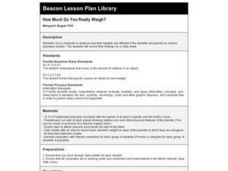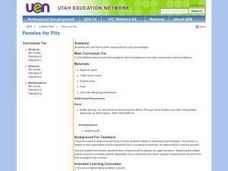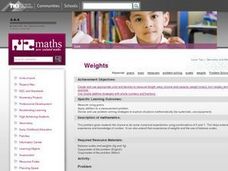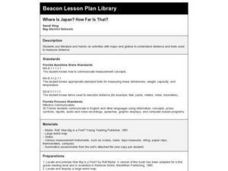Curated OER
What's It Worth? Thinking About Weights and Measures
Middle schoolers examine how weights and measures can be used to assess value, that traders must be wary of fraudulent practices, and appreciate the Akan weights as works of art.
Curated OER
How Much Do You Really Weigh?
Sixth graders check to see how their weights differ if they weighed themselves on different planets. They record their findings on a data sheet.
Curated OER
Pennies for Pits
Sixth graders use the edible and nonedible parts of various fruits to determine percentages. Using measurements and appropriate tools are part of the lesson.
Curated OER
Box-and-Whisker Plots
Eighth graders measure in feet and inches and convert to explore the relationship between the converted measurements. In this measurement lesson, 8th graders use the whisker and box plot to represent the measurement of a cat. Students...
Curated OER
Physics and Me
Sixth graders compare and contrast mass and weight. For this physics lesson, 6th graders calculate speed given distance and time information. They construct a rocket and relate this to Newton's 3rd Law of motion.
Curated OER
UNWRAPPING PACKAGING
Students study product packaging and determine if it is excessive and if it is recyclable. In this packaging lesson students examine and identify waste reduction techniques.
Discovery Education
Architects in Action
Hands-on and real-world applications are great ways to teach mathematical concepts. Creative thinkers examine how ratios are used to create scale models of buildings and structures. They practice working with ratios by looking at a map...
Curated OER
Are You My Little Peanut?
Fourth graders explore the mass and length of peanuts by pretending to parent a peanut. In this mode, median and range activity students graph their measurements and then use them to find the mode, median and range. Students discuss...
Virginia Department of Education
Mathematics Vocabulary Cards – Grade 4
An excellent way to reinforce math vocabulary in your classroom! Seventy-eight posters focus on number and number sense, computation and estimation, measurement, geometry, probability and statistics, and patterns, functions, and algebra.
Curated OER
Mass
Students determine how mass is a property of an object that can be measured, and examine how size affects mass. They work with balances and determine what units of measurement are associated with mass. Finally, they determine the...
Curated OER
Oranges and Stopwatches
Students measure various attributes of an orange. They discuss the attributes of an orange that can be measured, develop a list of attributes and describe how they can measure it, and rotate through four stations measuring the volume,...
Curated OER
Relative Weight
Second graders distinguish the difference between pounds and ounces and arrange manipulatives from heaviest to lightest.
Curated OER
Life Science: Heavy Weight
Students investigate adolescent obesity and its health impact. In this health and obesity lesson, students research the problem, develop a survey regarding eating habits, then analyze the nutritional information on commonly eaten foods...
Curated OER
Forces and Graphing
Middle schoolers analyze graphs to determine relationships between variables and rates of change. They determine the basic concepts about static reaction forces. They determine the slope and equation of a line.
Curated OER
Seesaws
Students make direct comparisons between objects using balance and spring scales. They also are encouraged to estimate which object is heavier by holding the objects before using the balance scales. Comparing the masses of objects is the...
Curated OER
Pounds and Ounces Practice 18.3
For this pounds and ounces worksheet, students find 4 objects that weigh more than 1 pound. Students write their names in the table. Students estimate the weight to the nearest pound. Students use a balance scale and a one pound measure...
Curated OER
Moisture Content Activity
Young scholars measure the moisture found in the wood that is used for furniture making. In this moisture worksheet, students practice using the MC formula to measure the water content of the wood.
Curated OER
Weights
Students find an object that they estimate weighs 20g and check estimates on the balance scales. They read the problem and work in pairs focusing their understanding on the size of grams.
Curated OER
Where Is Japan? How Far Is That?
First graders use literature and hands-on activities with maps and globes to explain distance and tools used to measure distance. They select tools to measure various objects in the classroom, then apply those concepts to their map...
Curated OER
Comparing and Ordering Numbers
Students compare, order, and measure objects. In this measurement lesson plan, students are assessed on their ability to order, compare, and measure objects. This is an assessment only lesson plan and does not include instruction.
Cornell University
Predicting Chemical Reactions
Prove the Law of Conservation of Mass through a lab investigation. A well-designed lesson asks groups to combine materials and monitor indicators for chemical reactions. Measuring the mass of the reactants and products allows individuals...
Cornell University
Chemical Reactions
Investigate the Law of Conservation of Mass through a lab exploration. Individuals combine materials to initiate chemical reactions. They monitor for signs of reactions and measure the masses before and after the reactions for comparison.
Concord Consortium
Two Pounds to Go
How hard can it be to measure out two pounds? A short performance task introduces a situation where a balance scale is broken. It gives a method for measuring out two pounds and asks learners to evaluate the procedure. They must prove...
It's About Time
The Mu of the Shoe
What is mu? Emerging scientists explore the coefficient of sliding friction, or mu, and apply its concepts as they complete activities in the interesting lesson. They measure the sliding friction between soles of their own athletic shoes...

























